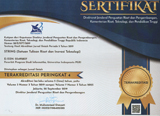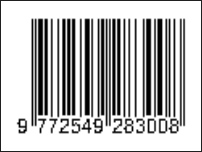Implementasi SQC (Statistical Quality Control) dalam Proses Pascapanen Tebu di PG. Madukismo
(1) Universitas Jenderal Soedirman
(2) Universitas Jenderal Soedirman
(*) Corresponding Author
Abstract
PG. Madukismo is a company engaged in the processing of sugarcane into sugar. In the sugar production process, in terms of raw materials, there are still mixtures or components of sugarcane that are not needed and desired. This is caused by external and internal factors of the company which will certainly affect the quality of the products produced. The purpose of this study is to identify the quality of sugarcane by using Statistical Quality Control (SQC) analysis. This study uses the seven tools method for quality control with the results of the research showing the cause of dirty sugarcane is around 14.44% of the total received sugarcane due to other components besides sugarcane that are needed such as dry leaves, roots, soil and etc. It was found that the types of quality problems that occurred in sugarcane received by the factory in 2021 were gross 1 (K1) with a percentage of 82.6%, gross 2 (K2) with a percentage of 6.5% and gross 3 (K3) with a percentage of 10.9%. The quality problem of sugarcane received by the factory is caused by human factors (workers), materials, methods, machines and the environment.
Keywords
Full Text:
PDFReferences
Dinas Pertanian. (2018). Tebu (Saccharum officinarum Linn). [Online]. Available: https://distan.bulelengkab.go.id/informasi/detail/artikel/tebu-saccharum-officinarum-linn-12
D. Hartatie, I. Harlianingtyas, dan Supriyadi, “Pengaruh Curah Hujan dan Pemupukan terhadap Rendemen Tebu di PG Asembagus Situbondo,” Proceedings Peran Teaching Factory di Perguruan Tinggi Vokasi dalam Mendukung Ketahanan Pangan pada Era New Normal, 2020, p. 47-54.
F. D. Septian, D. Setiawati, dan A. Pantjarani, “Sistem Informasi Manajemen Mutu Produk Laboratories Wonogiri,” Journal Informatic Technology and Communication, vol. 3, no. 2, pp. 1-12, 2020.
N. A. Wicaksono, “Pengendalian Kualitas Produk Baju Kerja Perawat untuk Meminimasi Jumlah Produk Cacat dengan Metode Seven Tools (Studi Kasus CV. Laras Mitra Sejati),” Skripsi, Fakultas Teknologi Industri, Universitas Islam Indonesia Yogyakarta, 2018.
D. Irwati dan D. I. Prasetya, “Mengurangi Cacat Color out Menggunakan Pendekatan Seven tools: Studi Kasus Industri Coloring Compound Plastic,” Jurnal Pelita Industri, vol. 1, no. 1, pp. 16-21, 2020.
M. R. Rosyidi, N. Izzah, dan T. K. Najahi, “Seven Tools untuk Menurunkan Kecacatan pada Produk Kopi,” Jurnal Optimalisasi, vol. 6, no. 2, pp. 142-155, 2020.
I. Idris, R. A. Sari, Wulandari, dan U. Uthumporn, “Pengendalian Kualitas Tempe dengan Metode Seven Tools,” Jurnal Teknovasi, vol. 3, no. 1, pp. 66-80, 2016.
T. P. Matondang dan M. M. Ulkhaq, “Aplikasi Seven Tools untuk Mengurangi Cacat Produk White Body pada Mesin Roller,” Jurnal Sistem dan Manajemen Industri, vol. 2, no. 2, pp, 59-66, 2018.
D. Diniaty dan Sandi, “Analisis Kecacatan Produk Tiang Listrik Beton Menggunakan Metode Seven Tools dan New Seven Tools (Studi Kasus: PT. Kunango Jantan),” Jurnal Hasil Penelitian dan Karya Ilmiah dalam Bidang Teknik Industri, vol. 2, no. 2, pp. 155-162, 2016.
M. M. Ulkhaq, N. W. Susatyo, Pramono, dan R. Halim, “Aplikasi Seven Tools untuk Mengurangi Cacat Produk pada Mesin Communite Di PT. Masscom Graphy, Semarang,” Jurnal Pasti, vol. 11, no. 3, pp. 220-230, 2017.
J. Radianza dan I. Mashabai, “Analisa Pengendalian Kualitas Produksi dengan Menggunakan Metode Seven Tools Quality di PT. Borsya Cipta Communica,” Jurnal Industri & Teknologi Samawa, vol. 1, no. 1, pp. 17-21, 2020.
N. Hairiyah, R. R. Amalia, dan E. Luliyanti, “Analisis Statistical Quality Control (SQC) pada Produksi Roti di Aremania Bakery,” Jurnal Teknologi dan Manajemen Agroindustri, vol. 8, no. 1, pp. 41-48, 2019.
E. Haryanto dan I. Novialis, “Analisis Pengendalian Kualitas Produk Bos Rotor pada Proses Mesin Cnc Lathe dengan Metode Seven Tools,” Jurnal Teknik: Universitas Muhammadiyah Tangerang, vol. 8, no. 1, pp. 69-77, 2019.
L. Permono, ST. Salmia, L. A., dan R. Septiari, “Penerapan Metode Seven Tools dan New Seven Tools untuk Pengendalian Kualitas Produk (Studi Kasus Pabrik Gula Kebon Agung Malang),” Jurnal Valtech (Jurnal Mahasiswa Teknik Industri), vol. 5, no. 1, pp. 58-65, 2022.
DOI: http://dx.doi.org/10.30998/string.v7i1.12703
Refbacks
- There are currently no refbacks.
Copyright (c) 2022 Figa Mahira, Hety Handayani Hidayat

This work is licensed under a Creative Commons Attribution 4.0 International License.
STRING (Satuan Tulisan Riset dan Inovasi Teknologi) indexed by:

Ciptaan disebarluaskan di bawah Lisensi Creative Commons Atribusi 4.0 Internasional.
View My Stats


 Sertifikat Akreditasi
Sertifikat Akreditasi
















